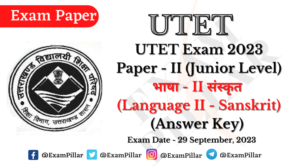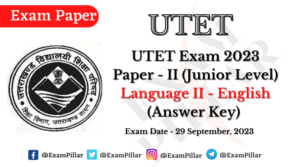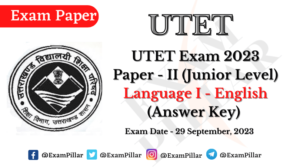उत्तराखंड विद्यालयी शिक्षा परिषद् (UBSE – Uttarakhand Board of School Education) द्वारा 26 नवम्बर 2021 को UTET (Uttarakhand Teachers Eligibility Test) की परीक्षा का आयोजन किया गया। UTET (Uttarakhand Teachers Eligibility Test) Exam 2021 Paper 2 – भाषा – II : अंग्रेजी की उत्तरकुंजी (Language II : English) यहाँ पर उपलब्ध है।
UBSE (Uttarakhand Board of School Education) Conduct the UTET (Uttarakhand Teachers Eligibility Test) 2021 Exam held on 26 November 2021. Here UTET Paper 2 Language II : English Subject Paper with Official Answer Key.
UTET (Uttarakhand Teachers Eligibility Test) Junior Level
(Class 6 to Class 8)
Exam :− UTET (Uttarakhand Teachers Eligibility Test)
Part :− भाषा – II : अंग्रेजी (Language II : English)
Organized by :− UBSE
Number of Question :− 30
SET – C
Exam Date :– 26th November 2021
UTET 26 Nov 2021 (Junior Level)
| UTET Junior Level Paper Answer Key | Link |
| UTET Exam 26 Nov 2021 – Paper – 2 (बाल विकास एवं शिक्षण विज्ञान) | Click Here |
| UTET Exam 26 Nov 2021 – Paper – 2 (Language – I : Hindi) | Click Here |
| UTET Exam 26 Nov 2021 – Paper – 2 (Language – I : English) | Click Here |
| UTET Exam 26 Nov 2021 – Paper – 2 (Language – II : Hindi) | Click Here |
| UTET Exam 26 Nov 2021 – Paper – 2 (Language – II : English) | Click Here |
| UTET Exam 26 Nov 2021 – Paper – 2 (Language – II : Sanskrit) | Click Here |
| UTET Exam 26 Nov 2021 – Paper – 2 (Mathematics & Science) | Click Here |
| UTET Exam 26 Nov 2021 – Paper – 2 (Social Studies) | Click Here |
UTET Exam 26 Nov 2021 Paper – 2 (Junior Level)
Language II (English)
(Official Answer Key)
Direction (Q. No. 61): Choose the correctly spelt word from the options given below –
61.
(A) Parralel
(B) Parrallel
(C) Parallel
(D) Paralel
Show Answer/Hide
Direction (Q. No. 62-63): In the following questions, some parts of a sentence have been jumbled up. Rearrange these parts which are labelled as P, Q, R, S to produce the correct sentence.
62. Each culture
P: flourishes when it comes
Q : own tradition and yet
R: draws strength from its
S: into contact with others
(A) RQPS
(B) SPQR
(C) RPQS
(D) SQPR
Show Answer/Hide
63. Summer vacation
P: that their children learn something worthwhile
Q: who are able to provide services for anxious parents
R: who want to make sure
S: has become a big business for those
(A) PRQS
(B) SQRP
(C) PQRS
(D) SRQP
Show Answer/Hide
Direction (Q. No. 64 to 68): Read the passage given below and answer the questions that follow by selecting the most appropriate option.
The supervisor would have to change his attitude towards people first. The staff under him must be perceived as human beings with feelings and needs. ‘They are not automations within a complex work machinery’. One of the greatest needs of today’s worker is to have a feeling that he is in control of his work place and not vice-versa. The best way is to satisfy this need as far as possible. He must feel firstly, that his work is meaningful. To do this, the supervisor must delegate responsibility and limited authority for the man to execute his job well.
The subordinate must be properly trained to assume responsibility and authority. Once he is ready to assume these he can be made accountable for his job. Very often supervisors assume all responsibility and accountability for fear of losing control of the workplace. This makes workers under him pawns in a vast chessboard. Delegating accountability gives the worker a purpose in life and the need to do a job well. Most important is to sit with each worker and chalk out common objectives and agreed norms to achieve them. This gives workers a security as to what is expected of them. When he has met his objectives, he certainly has a feeling of achievement. This feeling of achievement is the greatest motivator.
64. A human attitude on the part of the supervisor towards his staff is necessary to –
(A) get them to work.
(B) keep them happy.
(C) have a congenial atmosphere at workplace.
(D) get the best out of them.
Show Answer/Hide
65. Responsibility and accountability make a worker –
(A) shirk his duties
(B) do his job properly
(C) tense and frigtened
(D) vulnerable before his supervisors
Show Answer/Hide
66. Supervisors do not delegate responsibility and authority to their subordinates because –
(A) subordinates are not capable enough.
(B) they can’t trust their subordinates.
(C) they are apprehensive of losing their hold on the place of work.
(D) final responsibility is their’s.
Show Answer/Hide
67. The author’s motive is to –
(A) suggest a solution
(B) criticise the supervisor
(C) criticise the workers
(D) write a balanced article
Show Answer/Hide
68. Pick Pick out a word from the passage that means to understand or think of something in a particular way’ –
(A) Delegate
(B) Perceive
(C) Purpose
(D) Norms
Show Answer/Hide
Direction (Q. No. 69 to 73): Read the passage given below and answer the questions that follow by selecting the most appropriate option.
Experiments with the sulfonamides have made clear a fact about germs which is gaining increasing importance in fighting them. Germs, it seems, have the same ability as all the other living things gradually to change themselves to suit new conditions. But, as the generation of germs lasts only twenty, twenty-five or thirty minutes, before all the germs divide to form new ones, changes, that would take many years in animals, can be achieved by germs in a few hours. Perhaps then you give the attacking germ a dose of sulfonamides which upsets them somewhat but is not strong enough to prevent them from multiplying; if so, they very rapidly develop new powers which enable them to resist the effects of the drug. After this has happened, even the strongest dose will fail to disturb them.
69. Experiments with sulfonamides have led to the important discovery that
(A) germs are living things, and can change themselves to suit new conditions.
(B) one generation of germs lasts only twenty, twenty-five or thirty minutes.
(C) germs can adjust themselves to live and multiply in new conditions.
(D) germs are not disturbed even by the strongest possible dose of sulfonamides.
Show Answer/Hide
70. Like all other living things, germs can change themselves to suit new conditions. This adjustment is possible because the germs have –
(A) the power of fluctuation.
(B) the power of compliance
(C) the power of adoptability.
(D) the power of adaptability,
Show Answer/Hide
71. Since germs can change themselves to suit new conditions, the task of fighting them has become –
(A) absolutely impossible.
(B) much easier.
(C) much more difficult.
(D) increasingly important.
Show Answer/Hide
72. Germs, which are not disturbed even by the strongest possible dose of the sulfonamides, are said to have become
(A) immortal
(B) immune
(C) improvised
(D) immobile
Show Answer/Hide
73. One generation of germs expires, bringing into existence the next generation
(A) in twenty minutes
(B) in twenty-five minutes
(C) in not more than half an hour
(D) in a few hours
Show Answer/Hide
74. Which of the following are productive skills?
(A) Speaking & Writing
(B) Listening & Reading
(C) Listening & Speaking
(D) Reading & Writing
Show Answer/Hide
75. Learning a language is –
(A) a science
(B) an art and a science
(C) an art and not a science
(D) none of these
Show Answer/Hide




